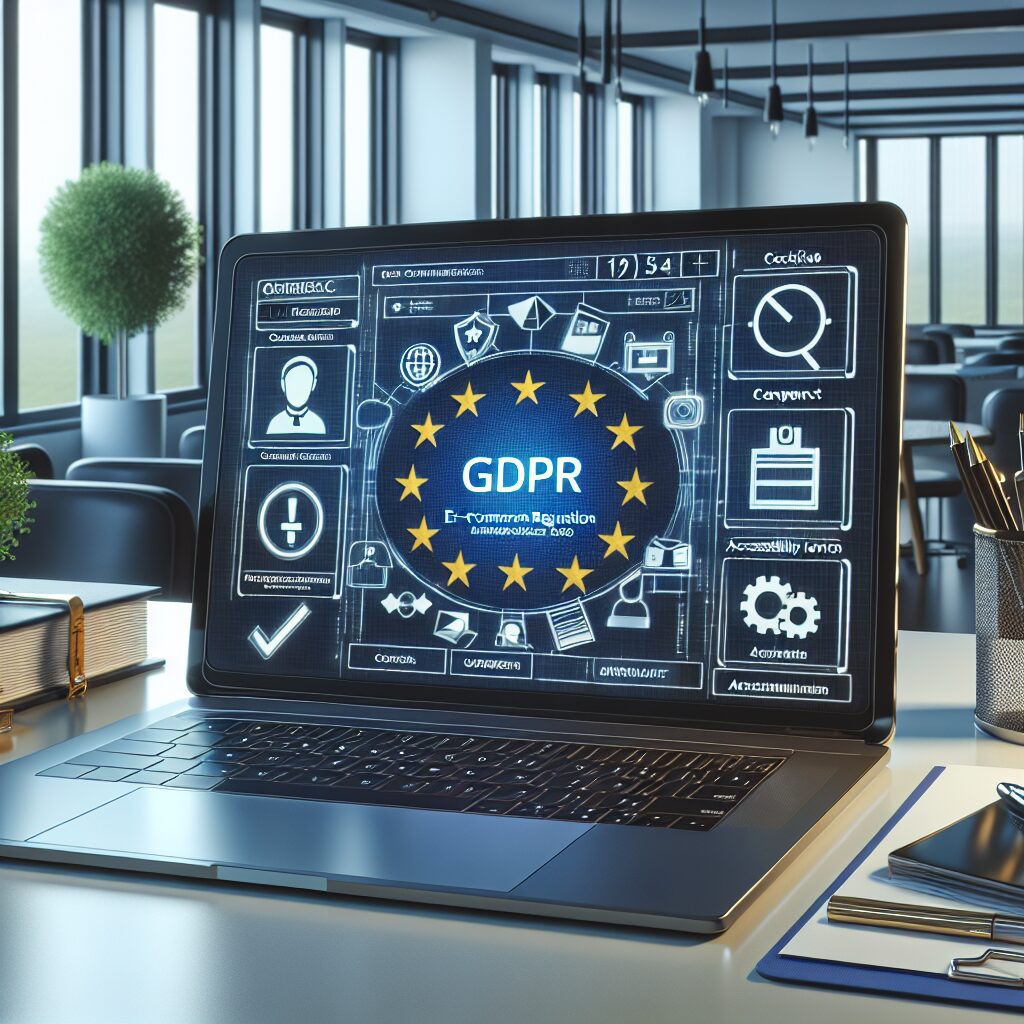About eldris
At Eldris, we automate SEO, multilingual site expansion, and EU compliance for brands scaling across Europe. Our AI-powered platform handles everything from content publishing to regulatory docs—so you don’t have to.
In This Article
- Legal compliance software helps automate audits, documentation, and regulatory updates.
- Ensure GDPR compliance with cookie banners and consent logs.
- Track EPR obligations, product safety labels, and import documentation automatically.
- Select a platform that fits your store size, product type, and budget.
- Stay informed using AI-driven alerts and software-supported policy updates.
- Join seller communities for compliance cost sharing and legal support tips.
UK Regulatory Landscape for E-Commerce in 2024
Overview of Key UK Laws Affecting Online Sellers
UK e-commerce businesses in 2024 face an increasingly complex network of regulations that govern data protection, environmental responsibilities, and product compliance. Every business that sells online must navigate critical legal frameworks to ensure their operations align with national and international standards. Failure to comply can lead to fines, reputational damage, and even suspension from online platforms.
The UK’s General Data Protection Regulation (UK GDPR) remains a cornerstone of data privacy law. It mandates how companies collect, store, and process user data. For online retailers, this affects not only checkout and account registration processes but also marketing, analytics, and cookie usage.
Another essential legislation is the Extended Producer Responsibility (EPR) regulation, which holds businesses accountable for the end-of-life management of their products and packaging. E-commerce retailers that import goods must ensure they meet EPR obligations or risk financial penalties.
Product safety laws—including the UK Product Safety and Metrology regulations—require retailers to verify that products sold via marketplaces or direct websites meet national safety standards. This includes correct usage of the UK Conformity Assessed (UKCA) marking or CE markings for specific categories. Notably, the UK Timber Regulation (UKTR) also plays a key role for sellers dealing with wooden products.

What Is Legal Compliance Software?
Core Functions and Benefits for UK Online Shops
Legal compliance software is a specialised digital toolset designed to help businesses automate and manage adherence to laws and regulations. For UK e-commerce sellers, it provides vital assistance in staying compliant with ever-changing legal requirements across multiple domains, including data privacy, environmental law, and product safety.
These platforms typically offer features such as document tracking, audit trails, consent collection and management, labelling oversight, and automated alerts for regulatory updates. By centralising compliance workflows, legal compliance software enables business owners to scale with confidence and drastically reduce manual workloads. It transforms what would be a daunting, resource-intensive task into a predictable and manageable operation.
Moreover, businesses benefit from dashboards providing real-time insights into their current compliance status, offering clarity on which actions or certifications are still required. This is particularly useful for online sellers managing numerous SKUs or working across borders where laws may vary between regions and product types.
Top Legal Compliance Tools for UK E-Commerce
Comparing Features: GDPR, EPR, Product Safety
Several legal compliance software tools specifically cater to the UK e-commerce sector. These platforms vary in terms of breadth, depth, and industry focus, making it important to select the right one based on your business’s unique needs.
One leading platform is OneTrust, known for its robust GDPR compliance capabilities. It offers comprehensive cookie consent tools, privacy policy generators, and data subject access request automation. It also includes EPR-centric tracking modules, helping sellers monitor their recycling and product return obligations.
Another notable solution is Seismic Legal, which targets regulated industries and provides robust product safety protocol documentation. With modules for supply chain verification, CE/UKCA labelling documentation, and integration with product inventory systems, it’s a strong choice for large-volume sellers with compliance-heavy inventories.
Smaller sellers might benefit from kits like Termly or Iubenda, which offer simpler GDPR and cookies compliance forms, legal document templates, and website policy tools at a lower cost. While not as comprehensive, these platforms are ideal for entrepreneurs or small shops seeking quick and reliable compliance fixes.
For plastic packaging and waste tracking, the UK’s NPWD portal (National Packaging Waste Database) is essential, and many B2B-focused compliance software platforms offer direct integration with government systems.
How to Choose the Best Solution for Your Store
Factors Like Cost, Automation, and Use Case Fit
Selecting the appropriate legal compliance software for your e-commerce shop requires a deep understanding of both your business operations and the regulatory domains that affect them. Start by auditing your products: do you sell electronics, toys, cosmetics, or food items? If so, safety labelling and regulatory registrations are key. Do you process personal data or target EU markets? Then GDPR-compliance must be prioritised.
Cost is also a major factor. Enterprise-level tools like OneTrust can carry steep monthly fees, while smaller SaaS options provide essential functionality at a fraction of the price. Carefully assess pricing models—some charge per user, per domain, or per document template, all of which affect scalability.
Automation is another crucial consideration. Legal compliance software that offers automated document generation, policy updates, and audit reminders will drastically reduce administrative load. The ability to integrate with your CMS, ERP, or product catalogue systems adds immense value, especially for omnichannel sellers. Learn more about E-Commerce Compliance and Automation
Finally, consider customer support. Being able to quickly access legal advice or technical guidance when navigating new regulations gives your business peace of mind during audit periods or sudden rule changes.
Automating Product Safety and Labeling Compliance
Staying Aligned with UKTR and CE Mark Requirements
Product safety and labelling compliance are non-negotiable for UK sellers. Legal compliance software can provide automatic validation and documentation workflows to ensure your product listings, packaging, and website content meet current legal requirements.
With the UK’s departure from the EU, the UK Conformity Assessed (UKCA) mark has been introduced to replace CE markings in many product segments. Vendors must not only ensure correct usage but must also maintain up-to-date technical files, conformity declarations, and testing certificates. Software solutions can track expiry dates of certifications, notify if your supplier documentation is incomplete, and auto-archive outdated files, preventing non-compliance episodes.
Sellers dealing in timber products must remain compliant with the UK Timber Regulation (UKTR). Legal compliance platforms ensure appropriate supply chain tracking, verifying that sources meet legal import standards. For electronics and toys, additional standards like Electrical Equipment Safety Regulations (EESR) or the Toys (Safety) Regulations must be considered, and automation tools assist in flagging any gaps pre-sale.
Consent, Cookies, and GDPR Software Use
Ensuring Data Protection Compliance Made Easy
Under UK GDPR, businesses are legally obliged to obtain express, informed consent when collecting user data. This includes anything from email capture on newsletters, to website cookies for analytics. Legal compliance software excels here, offering easy-to-install banners and callbacks that log user decisions while maintaining audit-ready logs.
A quality solution will not only collect consent but also allow users to adjust or revoke permissions in compliance with data subject rights—a commonly overlooked obligation that can lead to heavy enforcement. Software like Cookiebot or TrustArc integrates with your CMS to deploy compliant interfaces without deep development work.
Furthermore, these platforms oftentimes include data mapping tools, allowing owners to visualise all data flow journeys—ensuring thorough adherence to Article 30 recordkeeping requirements. They also facilitate DSARs (data subject access requests), another crucial GDPR requirement. Key UK e-commerce regulations and requirements
AI-Driven Alerts and Policy Update Automation
Staying Ahead of Regulation Changes
One of the most powerful benefits of advanced legal compliance software is real-time monitoring for legislative updates. Regulatory authorities regularly update guidance, introduce new reporting formats, or redefine previously accepted practices. Relying on AI-driven alerts helps businesses stay ahead.
Policy automation tools that generate new versions of your privacy policies or product declarations when laws change ensure that your online presence remains up to date without manual replication. This level of agility allows e-commerce businesses to maintain compliance across jurisdictions with minimal lag time between updates and implementation.
AI features can also assess policy exposures automatically. For example, if a regulation mandates a definition of ‘personalised advertising’ in cookie policies, the system can detect whether your current policy includes it—and prompt you to adjust accordingly. These proactive processes can dramatically decrease risk exposure for fast-scaling businesses. Read a related article
Case Study: Compliance Success with Automation
Real-World Example of a UK Store Avoiding Fines
Consider the case of Oakley Interiors, a mid-sized furniture retailer based in Essex. In early 2023, the company faced a warning from the Environment Agency due to improper documentation linked to their imported timber range. Their legal advisors recommended deploying a compliance automation suite tailored for environmental regulations.
After integrating the system, Oakley Interiors was able to auto-generate required declarations, certificates of origin, and due diligence records for each shipment. The company also linked their inventory management platform to ensure that only certified products could be listed on their storefront.
Furthermore, GDPR compliance modules were added—complete with custom cookie tools and centralised consent logs. By year-end, Oakley passed a government audit with zero infractions, and even received a commendation for going beyond minimum standards. This transformation illustrates how selectively implemented legal compliance software can turn liabilities into competitive advantages.
Risks of Non-Compliance: What to Avoid
From Fines to Platform Bans—Avoid Costly Mistakes
The risks of non-compliance are both severe and multifaceted. Financial penalties for breaching GDPR can reach £17.5 million or up to 4% of global turnover. Similarly, failure to comply with product safety standards can result in compulsory recalls, marketplace takedowns, or worse—legal prosecution.
Major e-commerce platforms like Amazon and eBay are increasingly stringent. Sellers identified as failing to meet regulatory obligations often find their listings suspended or accounts terminated without notice. Complaints from consumers about safety labels, missing EPR codes, or unclear return policies often trigger automated investigation routines, especially under the lens of AI moderation tools.
Even less explosive missteps—such as outdated terms & conditions or lack of accessibility for policy documents—can put sellers at legal risk. Accurate, automated, and visible compliance is both a necessity and a protective shield in 2024’s commerce landscape.
Community Insights and Advice
How Sellers Collaborate on Compliance Challenges
Many UK-based e-commerce sellers are turning to forums, industry associations, and peer groups to navigate legal compliance challenges. Communities like UK Sellers Network or the Online Retail Association offer regular updates on regulations, interpreted through practical business advice rather than legal jargon.
One growing trend is the formation of “compliance pods”—small groups of brands that jointly subscribe to software tools, share audit templates, and exchange best practices. Not only do these reduce individual subscription costs, but they also promote accountability and collective learning.
Webinars and policy roundtables hosted by compliance software providers often include Q&A sessions with in-house lawyers, giving sellers access to otherwise expensive advice. Leveraging these free community-based insights creates a powerful, flexible compliance infrastructure that evolves with industry demands.
“Legal compliance is no longer a burden—it’s a business asset when managed correctly through trusted software solutions.”
Conclusion: Achieving Scalable Compliance in 2024
In 2024, leveraging legal compliance software isn’t just a best practice—it’s a business imperative. With regulatory challenges expanding across data protection, environmental responsibilities, and product safety, sellers must equip themselves with automated, agile platforms to survive and succeed.
From GDPR adherence and cookie consents to EPR tracking and UKCA labelling, the right solution streamlines operations, enhances trust, and prevents costly mistakes. Whether you operate a growing Shopify store or a multinational Amazon operation, investing in legal compliance software positions your business for long-term sustainability and growth.
Great guide on legal-compliance-software-uk-ecommerce-guide-interactive – Community Feedback
What UK laws must e-commerce sellers comply with?
UK e-commerce sellers must meet requirements including the Consumer Rights Act, GDPR, EPR, product safety standards, and accessibility regulations to operate legally and avoid penalties.
How does compliance software help UK online shops?
Compliance software helps automate legal document creation, policy updates, consent management, and alerts for new regulatory changes, ensuring online shops stay fully compliant with UK law.
Can legal software reduce the risk of fines for UK sellers?
Yes, dedicated legal compliance software keeps sellers updated on obligations, helps automate required documentation, and minimises the risk of non-compliance fines or account suspension.








